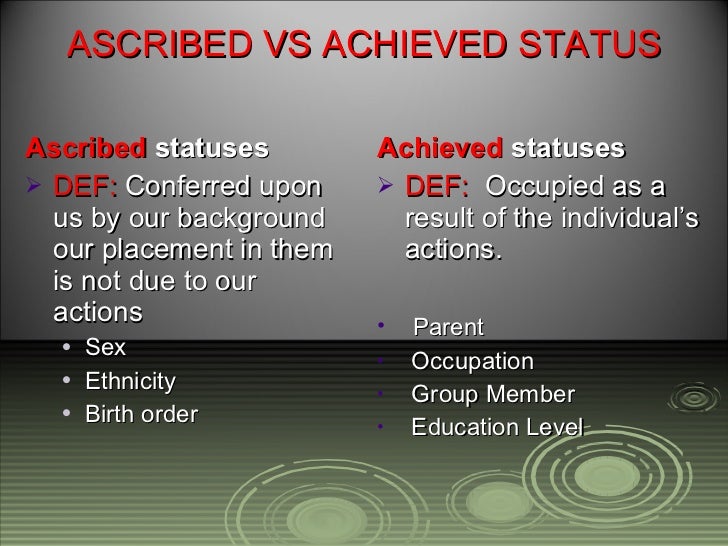Imagine walking into a room and instantly being categorized, judged, and even treated differently based on factors you have absolutely no control over. This is the reality of ascribed status, a social concept that shapes our lives in complex and often invisible ways. From the moment we are born, we are assigned a set of labels—race, gender, socioeconomic background, family lineage—that influence the opportunities we have, the challenges we face, and even the way we see ourselves.

Image: study.com
Understanding the concept of ascribed status is crucial for navigating a world rife with social inequalities. It helps us break down the insidious biases that perpetuate discrimination and empower us to fight for a more just and equitable society. This article delves into the intricacies of ascribed status, exploring its historical roots, its impact on individuals, and the ongoing societal implications of this powerful sociological construct.
Defining Ascribed Status: The Labels We Inherit
Ascribed status, as opposed to achieved status, refers to social positions that are assigned to individuals at birth or involuntarily later in life. These characteristics are often based on factors beyond an individual’s control, such as:
- Race and ethnicity: The social categories based on perceived physical differences, cultural heritage, and ancestry.
- Gender: The social roles, behaviors, and expectations associated with biological sex.
- Social class: A person’s position within the socioeconomic hierarchy based on factors like wealth, income, and education.
- Nationality: The legal status of belonging to a particular country.
- Family lineage: The social standing derived from the family one is born into, often associated with wealth, power, or prestige.
These ascribed characteristics shape our life experiences in profound ways, often impacting our access to resources, social networks, and opportunities. They can influence everything from our education and employment prospects to our chances of experiencing discrimination and prejudice.
The Historical Roots of Ascribed Status: From Caste Systems to Modern Inequality
The concept of ascribed status has deep roots in human history. Throughout various cultures and civilizations, rigid social hierarchies have been established, largely based on factors beyond individual merit. Ancient societies, like the caste system in India, enforced strict social divisions based on birth, limiting individual mobility and opportunity.
The concept of ascribed status played a dominant role in shaping societal structures throughout history, influencing everything from economic systems to religious beliefs. The idea that certain groups were inherently superior to others fueled discrimination and oppression, leading to centuries of social injustices.
The Persistent Impact of Ascribed Status in Modern Society
While many societies have moved away from the overt forms of discrimination seen in the past, the subtle and often unconscious biases associated with ascribed status continue to permeate modern society. These biases can manifest in numerous ways:
- Implicit bias: Unconscious prejudices that can influence our judgements and behaviors.
- Stereotyping: Generalizations about entire groups of people based on perceived characteristics.
- Discrimination: Unfair treatment based on ascribed status, impacting access to education, employment, housing, and other essential resources.
- Social mobility limitations: The difficulty of moving up the social ladder due to pre-existing disadvantages associated with ascribed status.
These biases can have a profound impact on individual lives, leading to disparities in educational attainment, income, health outcomes, and even life expectancy.

Image: www.slideshare.net
The Intersectionality of Ascribed Status: The Complex Interplay of Multiple Identities
One of the most critical aspects of understanding ascribed status is recognizing that these characteristics do not exist in isolation. Individuals often hold multiple ascribed identities, which intersect and interact in complex ways. For example, a woman of color experiences the world differently than a white woman or a black man, as the combination of race and gender creates unique forms of oppression.
Understanding the intersectionality of ascribed status is essential for recognizing the nuanced ways in which individuals are impacted by social hierarchies. It enables us to see the interconnectedness of different forms of discrimination and challenge the false notion that these categories are independent of one another.
Breaking Down the Walls of Ascribed Status: Embracing Diversity and Fighting for Equality
While ascribed status presents challenges and inequalities, it is crucial to acknowledge that these labels do not define us as individuals. We have the power to transcend the limitations imposed upon us by societal structures and strive for a more just and equitable world.
This journey begins with acknowledging the existence of these biases and understanding their impact. It involves challenging stereotypes, promoting inclusivity, and actively working to dismantle systems of oppression. By embracing diversity and celebrating the unique perspectives each individual brings to the table, we can create a more just and equitable society that values and respects everyone, regardless of their ascribed status.
An Ascribed Status Is
Conclusion: Creating A Future Without Ascribed Status
Understanding the concept of ascribed status is a critical step in navigating the complex social landscape we live in. By recognizing the labels we carry and the biases they can evoke, we can begin to break down the walls that separate us and create a more inclusive and equitable society. While achieving true equality may require a long and arduous journey, it is one that we must collectively embark on to ensure a future where our opportunities and destinies are determined not by our ascribed status but by our individual abilities and aspirations.
The fight for equity is a continuous process that requires ongoing awareness, empathy, and active engagement. It is up to each of us to challenge the assumptions and biases that perpetuate inequality, to champion diversity, and to strive for a world where everyone has the chance to reach their full potential, regardless of their ascribed status.






